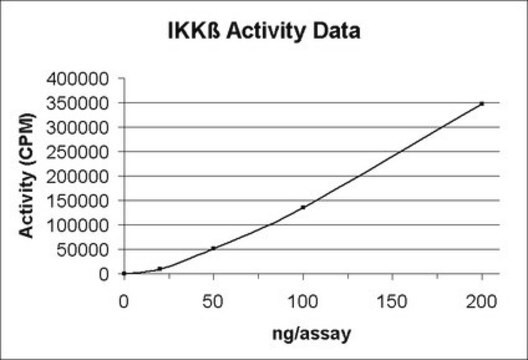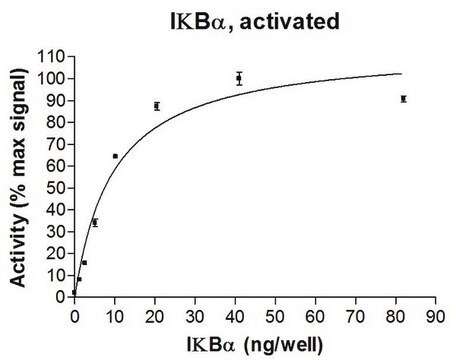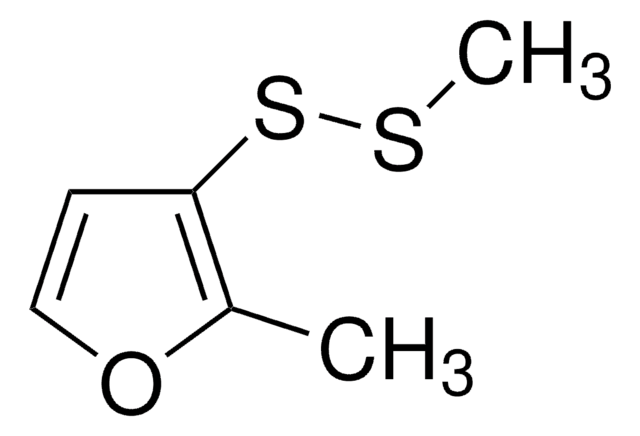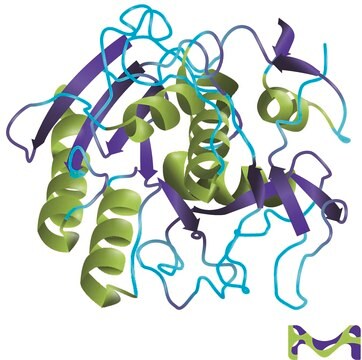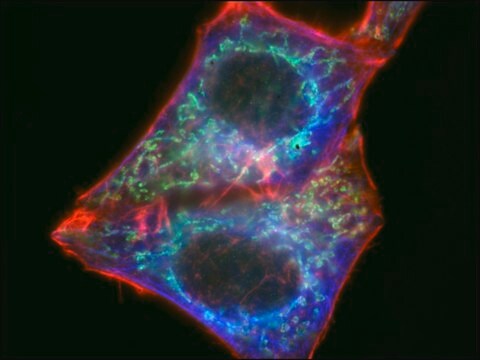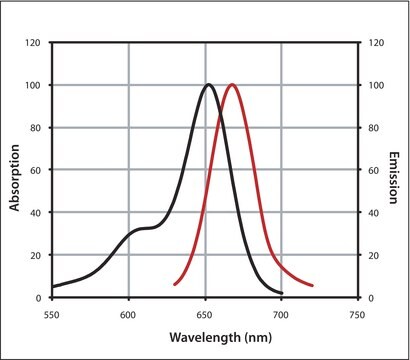About This Item
Código UNSPSC:
12352200
eCl@ss:
32160405
NACRES:
NA.27
Productos recomendados
descripción
protein target IKKβ
Nivel de calidad
Análisis
≥70%
actividad específica
58 pmol/min-μg
concentración
0.1 mg/mL
técnicas
activity assay: suitable
Nº de acceso UniProt
Información sobre el gen
human ... IKBKB(3551)
Descripción general
FUNCTION: SwissProt: O14920 # Phosphorylates inhibitors of NF-kappa-B thus leading to the dissociation of the inhibitor/NF-kappa-B complex and ultimately the degradation of the inhibitor. Also phosphorylates NCOA3 (By similarity).
SIZE: 756 amino acids; 86564 Da
SUBUNIT: Preferentially found as a heterodimer with IKK-alpha but also as a homodimer. Directly interacts with IKK-gamma/NEMO and TRPC4AP. The tripartite complex can also bind to MEKK1, MAP3K14/NIK, IKAP and IKB-alpha-p65-p50 complex. Phosphorylated IKB-alpha is further released from the complex. Found in a complex composed of NCOA2, NCOA3, IKKA, IKBKG and CREBBP. Interacts with SQSTM1 through PRKCZ or PRKCI. Forms an NGF-induced complex with IKBKB, PRKCI and TRAF6. May interact with MAVS/IPS1. Interacts with NALP2. Interacts with Yersinia yopJ.
SUBCELLULAR LOCATION: Cytoplasm.
TISSUE SPECIFICITY: Highly expressed in heart, placenta, skeletal muscle, kidney, pancreas, spleen, thymus, prostate, testis and peripheral blood.
PTM: Upon cytokine stimulation, phosphorylated on Ser-177 and Ser- 181 by MEKK1 and/or MAP3K14/NIK; which enhances activity. Once activated, autophosphorylates on the C-terminal serine cluster; which decreases activity and prevents prolonged activation of the inflammatory response. & Yersinia yopJ may acetylate Ser/Thr residues, preventing phosphorylation and activation, which blocks the I-kappa-B signaling pathway.
SIMILARITY: SwissProt: O14920 ## Belongs to the protein kinase superfamily. Ser/Thr protein kinase family. IkappaB kinase subfamily. & Contains 1 protein kinase domain.
SIZE: 756 amino acids; 86564 Da
SUBUNIT: Preferentially found as a heterodimer with IKK-alpha but also as a homodimer. Directly interacts with IKK-gamma/NEMO and TRPC4AP. The tripartite complex can also bind to MEKK1, MAP3K14/NIK, IKAP and IKB-alpha-p65-p50 complex. Phosphorylated IKB-alpha is further released from the complex. Found in a complex composed of NCOA2, NCOA3, IKKA, IKBKG and CREBBP. Interacts with SQSTM1 through PRKCZ or PRKCI. Forms an NGF-induced complex with IKBKB, PRKCI and TRAF6. May interact with MAVS/IPS1. Interacts with NALP2. Interacts with Yersinia yopJ.
SUBCELLULAR LOCATION: Cytoplasm.
TISSUE SPECIFICITY: Highly expressed in heart, placenta, skeletal muscle, kidney, pancreas, spleen, thymus, prostate, testis and peripheral blood.
PTM: Upon cytokine stimulation, phosphorylated on Ser-177 and Ser- 181 by MEKK1 and/or MAP3K14/NIK; which enhances activity. Once activated, autophosphorylates on the C-terminal serine cluster; which decreases activity and prevents prolonged activation of the inflammatory response. & Yersinia yopJ may acetylate Ser/Thr residues, preventing phosphorylation and activation, which blocks the I-kappa-B signaling pathway.
SIMILARITY: SwissProt: O14920 ## Belongs to the protein kinase superfamily. Ser/Thr protein kinase family. IkappaB kinase subfamily. & Contains 1 protein kinase domain.
Calidad
Evaluated by Kinase assay: 10 µl of varying amounts of IKKβ was mixed with 5 µl of 1 mg/ml IKKtide synthetic peptide substrate and 5 µl of distilled water. Reaction was initiated by adding 5 µl of 250 µM [33P]-ATP and incubating for 15 min at 30°C followed by spotting the reaction on phosphocellulose paper, fixing in 1% phosphoric acid, and assaying with a scintillation counter.
Propiedades físicas
105 kDa
Forma física
50 mM Tris-HCl, pH 7.5, 150 mM NaCl, 10 mM glutatione, 0.1 mM EDTA, 0.25 mM DTT, 0.1 mM PMSF, 25% glycerol
Almacenamiento y estabilidad
Stable for > 6 month at –80°C from date of receipt.
Cláusula de descargo de responsabilidad
Unless otherwise stated in our catalog or other company documentation accompanying the product(s), our products are intended for research use only and are not to be used for any other purpose, which includes but is not limited to, unauthorized commercial uses, in vitro diagnostic uses, ex vivo or in vivo therapeutic uses or any type of consumption or application to humans or animals.
Certificados de análisis (COA)
Busque Certificados de análisis (COA) introduciendo el número de lote del producto. Los números de lote se encuentran en la etiqueta del producto después de las palabras «Lot» o «Batch»
¿Ya tiene este producto?
Encuentre la documentación para los productos que ha comprado recientemente en la Biblioteca de documentos.
Nuestro equipo de científicos tiene experiencia en todas las áreas de investigación: Ciencias de la vida, Ciencia de los materiales, Síntesis química, Cromatografía, Analítica y muchas otras.
Póngase en contacto con el Servicio técnico